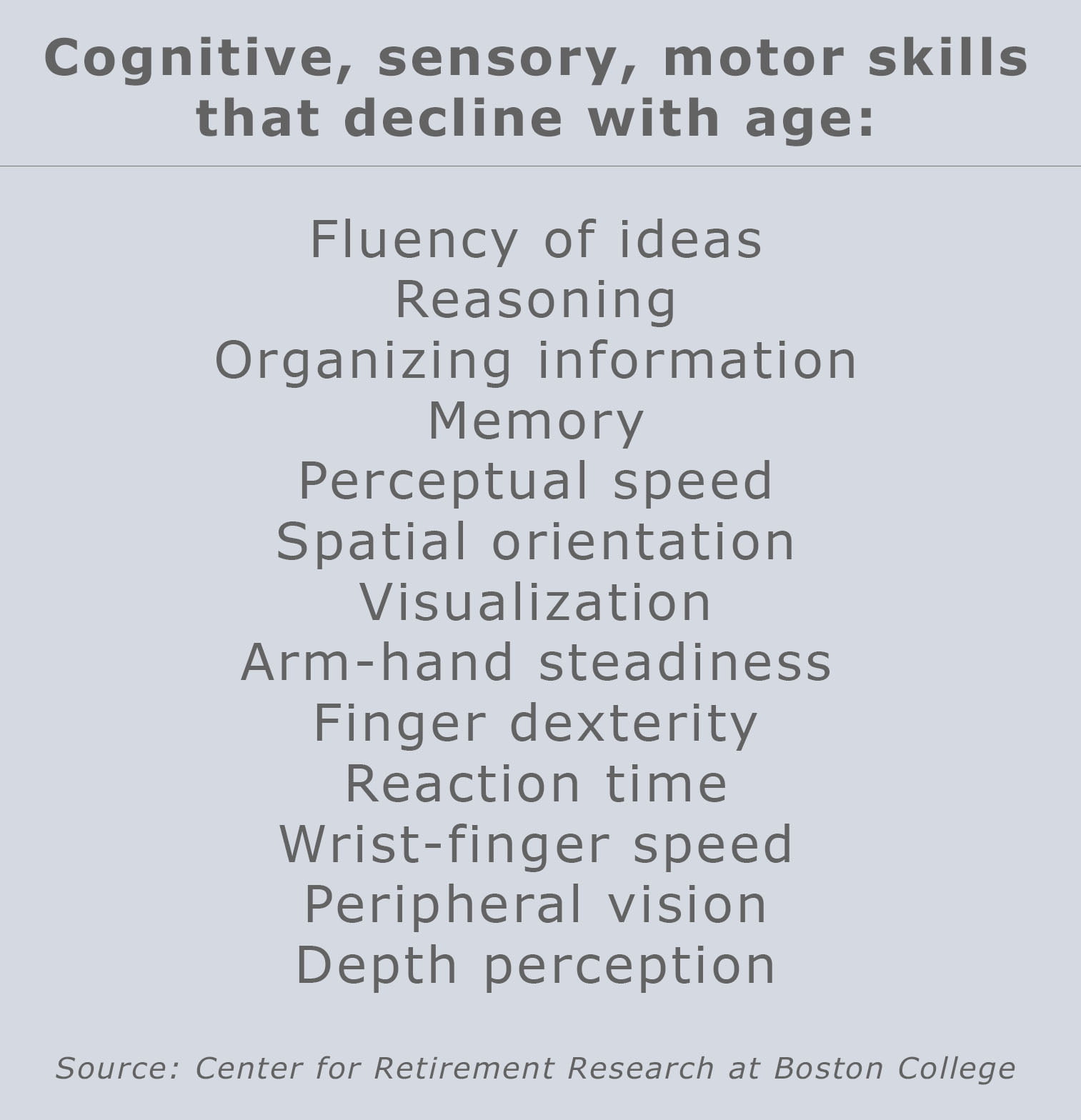
White-Collar Jobs Age-Sensitive Too
 It’s widely recognized that blue-collar workers retire relatively early, when their bodies start wearing out. But the assumption has been that people in less physically demanding white-collar jobs can carry on.
It’s widely recognized that blue-collar workers retire relatively early, when their bodies start wearing out. But the assumption has been that people in less physically demanding white-collar jobs can carry on.
However, that does not hold true for all white-collar occupations, according to a newly released study by the Center for Retirement Research, which supports this blog. This finding is especially relevant amid renewed discussions about again increasing the age when workers can claim their full Social Security benefits.
This would effectively reduce everyone’s benefits by about 7 percent for each year the age is raised. Benefits are reduced either because individuals must wait longer to claim their full monthly benefit (which means receiving the benefit for a shorter period of time) or because they would receive a smaller monthly benefit if they don’t wait. The reduced monthly benefit would affect people who might be pushed into an earlier retirement due to age-related limitations on what they can do.
Factory or construction workers are classic examples: critical attributes, such as strength and flexibility, atrophy with age. But so do many cognitive and other requirements common to both white- and blue-collar jobs. Memory slips, eyesight blurs, and reaction times are no longer as sharp as they used to be.
Many white-collar occupations stand out for being dependent on skills that tend to fade. Police detectives are reliant on deductive reasoning to solve cases, making this profession among the most susceptible to cognitive decline. The study found that detectives are just as likely to experience age-related difficulties as assemblers of machinery and equipment, who require skills ranging from interpreting blueprints to finger dexterity.
Or consider electrical engineers whose problem-solving skills erode with age. This makes them about as vulnerable as aging restaurant cooks, who lose the physical strength they need for kitchen work, as well as the ability to mentally catalogue customers’ orders and other information.
Other highly susceptible white-collar jobs include supervisor, administrator, pharmacist, secretary, licensed practical nurse, and professional photographer. These and other white-collar professions are reliant on various cognitive and sensory skills assessed in the study and listed in the above box.
Blue-collar workers remain the most susceptible to age-related declines. But, “The notion that all white-collar workers can work longer and all blue-collar workers cannot is too simplistic,” the researchers conclude.
The research reported herein was performed pursuant to a grant from the U.S. Social Security Administration (SSA) funded as part of the Retirement Research Consortium. The opinions and conclusions expressed are solely those of the author(s) and do not represent the opinions or policy of SSA or any agency of the federal government. Neither the United States Government nor any agency thereof, nor any of their employees, makes any warranty, express or implied, or assumes any legal liability or responsibility for the accuracy, completeness, or usefulness of the contents of this report. Reference herein to any specific commercial product, process or service by trade name, trademark, manufacturer, or otherwise does not necessarily constitute or imply endorsement, recommendation or favoring by the United States Government or any agency thereof.
Comments are closed.







“As long as you tell me about this change ahead of time” is always my response to hearing about Social Security changes. Given enough years lead-time, I could always increase my own retirement savings contributions to make up for an impact to the Social Security payout. Just no last minute surprises, please.
This is why employers encourage workers to retire at their full retirement age or sooner. You have a employees with declining abilities having the highest salaries, wages, and benefit costs.
It’s no wonder that so many employers offer early retirement packages.
The attacks on Social Security (think about the name of the program) began as soon as the bill was passed in the mid 1930’s as the first significant policy action of the Roosevelt Administration.
It worked fine. The turn to right wing populism in the 1980’s allowed the idea to gain legitimacy that society could not afford to provide for old age. This also worked to cover the emerging consensus in public health that a single payer health care initiative of some kind was essential. Now 30+ years later everyone is convinced of two lies: we cannot afford the old OR the sick.
Think about how much more money this gives the 99%